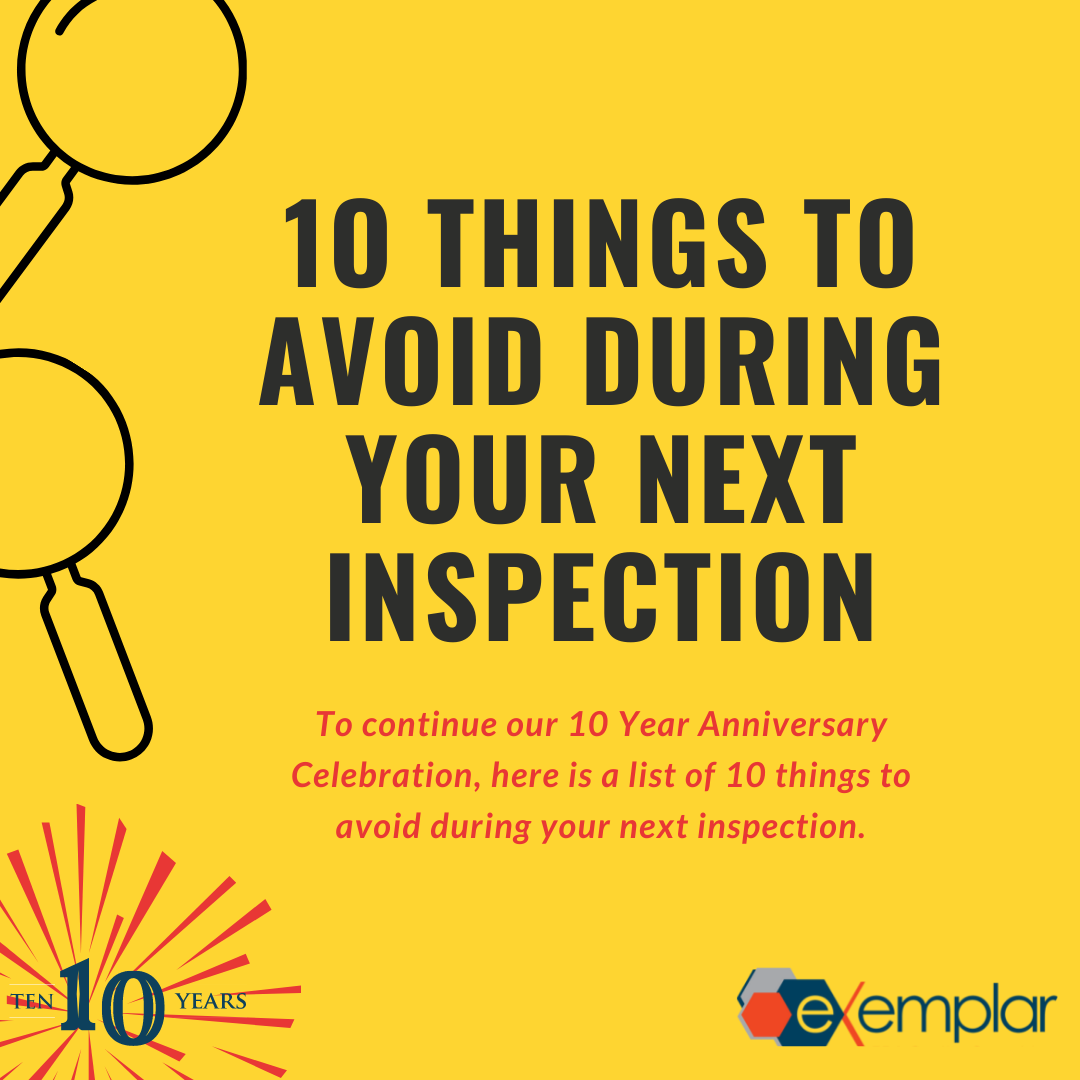Inspection Readiness is an important element to any quality system. Whether you are manufacturing biologics, pharmaceutical products, medical devices, IVDs, or combination products, it is important to have a solid plan for Inspection Readiness.
Once you have begun your FDA inspection, it is important to keep things on track while preparing documents, executing inspection tours, and explaining your daily operations.
Here is a clever list of “10 Things to Avoid During Your Next Inspection” to help you prepare for your next FDA Inspection or Notified Body Inspection. This same list can be adopted to your internal quality audits as well as corporate quality audits.
To celebrate our 10 year anniversary we are continuing our festivities with a list of 10 things to avoid during your next inspection.
10 Things To Avoid:
1. Uncontrolled Documents & Demonstrating on Uncontrolled (Non-Validated) Systems
When presenting information to the US FDA, Notified Body or internal audit team make sure to provide controlled documents whenever possible. These documents should be approved, released, version controlled and in a formal system defined by procedures or work instructions.
When showing documents electronically, use a validated system. This system may be an electronic cloud-based Quality System (eQMS) or a validated document repository. When possible, avoid showing documents from personal computer desktop files, uncontrolled spreadsheets, or personal Microsoft Word documents during a quality audit or FDA Inspection.
2. Incomplete Training
As part of Inspection Readiness, all employees should have their training completed prior to the anticipated inspection date. It is a good idea to review the training records to make sure that the correct training has been assigned, and that the training records are accurate & complete.
Training records should be stored in a secured, controlled location or eQMS whenever possible.
3. Past Due Equipment Calibration and Maintenance
Prior to your FDA inspection make sure there aren’t any past due (or late) equipment calibrations or maintenance (PMs). It is important to review calibration and preventive maintenance records as part of Inspection Readiness because maintenance and calibration activities that have not been completed are easy observations for any inspector.
4. Missing Job Descriptions & Organizational Chart
Prepare an organization chart for your facility or company and be sure that all job descriptions are up to date. At a minimum, the job description should contain title, responsibilities, authority, and reporting structure. These should be controlled documents. Review your current job description as part of your inspection readiness activities.
5. The “Runaway Train”
During an FDA inspection or quality audit it is important to avoid the “Runaway Train!” The runaway train occurs when an inspection goes off course and does not follow the agenda. Sometimes this occurs when subject matter experts (SMEs) volunteer information outside of the scope of the audit, or the auditor has a keen interest in learning about a new product or process that is not within the scope of the inspection. We call this the “Runaway Train” because it can start very slowly, but can quickly consume your audit time and valuable resources. As a result, it can significantly extend the duration of the audit/inspection.
If you see your audit veering significantly from the scope or intended purpose it is important to politely redirect the lead auditor or inquire as to the scope and stated agenda.
6. Unprepared Employees & Area Experts
Make sure your area experts or subject matter experts are prepared to explain their systems, processes, instrumentation or equipment. These experts should be identified early, and given explicit training. (Need a little help with this? – just give us a call)
7. Missing Batch Records
Review records that will be the subject of the inspection and ensure that all manufacturing or test records are complete. If you are unsure of what records to review as part of inspection readiness, it is a best practice to review at least the last 2 years of records subject to the scope of the inspection. If this is a for cause or directed audit this scope would be narrowed.
8. Messy Warehouse (Quarantine Cage Too!)
As part of Inspection Readiness it is essential to make sure that your warehouse and quarantine area are ready for an FDA or Notified Body Inspection. Everything should be clean, orderly, and representative of product lists or location codes. Inspection readiness isn’t just about documentation; it is also about the look and feel of the facility. We certainly recommend that client have a third party or someone from outside of their facility do a walk through with fresh eyes. This allows the site to capture inspection readiness items early on.
9. Aging Open CAPAs & Complaints
Review open or aging (old) CAPAs and complaints prior to your inspection. Subsequently, make sure to update records to ensure the investigations are as complete as possible. If you have not already done so, risk assess the open items and determine the possible impact to patients or products.
10. Not Having a Planned Tour Route
Make sure you have a clear tour route for your facility. walkways should be clear and the process should be as accessible as possible. You don’t want inspectors climbing over boxes or squeezing through narrow walkways with overstuffed racks on either side. The tour route should be easy to navigate and should have a logical flow. Don’t forget to consider the inspector’s safety when determining your route.
The List: 10 Things to Avoid During Your Next Inspection
- Uncontrolled Documents & Demonstrating on Uncontrolled (Non-Validated) Systems
- Incomplete Training
- Past Due Equipment Calibration and Maintenance
- Missing Job Descriptions & Organizational Chart
- The “Runaway Train”
- Unprepared Employees & Area Experts
- Missing Batch Records
- Messy Warehouse (Quarantine Cage Too!)
- Aging Open CAPAs & Complaints
- Not Having a Planned Tour Route
****
Need a little help with Inspection Readiness or have a few questions? Feel free to give Exemplar Compliance a call. We are happy to help you with a customized Inspection Readiness solution or provide training to your site. Our team of seasoned professionals have years of experience with Pre-Approval Inspections (PAIs), For Cause Inspections, FDA 483 Response, FDA Warning Letter Remediation and Consent Decree Remediation. We can build new Quality Systems or integrate existing Quality Systems from different organizations to create a compliant solution that fits your business needs.







